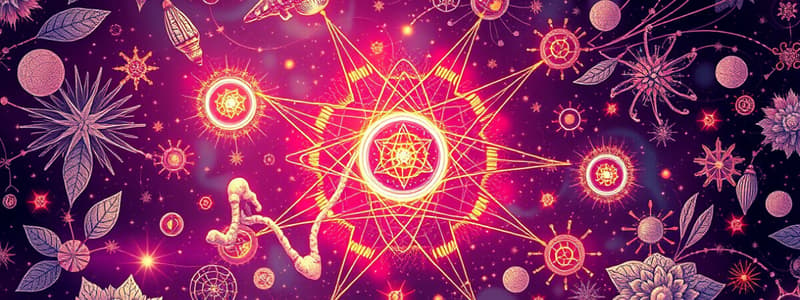Podcast
Questions and Answers
What is every single thing made of?
What is every single thing made of?
atoms
What is an atom?
What is an atom?
The smallest basic unit of matter
Atoms consist of three types of smaller particles: __________.
Atoms consist of three types of smaller particles: __________.
protons, neutrons, electrons
What kind of charge do protons have?
What kind of charge do protons have?
What kind of charge do electrons have?
What kind of charge do electrons have?
What kind of charge do neutrons have?
What kind of charge do neutrons have?
What do protons and neutrons form?
What do protons and neutrons form?
What is one particular type of atom that cannot be broken down into a simpler substance by ordinary chemical means?
What is one particular type of atom that cannot be broken down into a simpler substance by ordinary chemical means?
All atoms of a given element have a specific number of ______________.
All atoms of a given element have a specific number of ______________.
The electrons in the atoms of each element determine the _________________ of that element.
The electrons in the atoms of each element determine the _________________ of that element.
Electrons move around the nucleus in regions called?
Electrons move around the nucleus in regions called?
Atoms are most stable when they have a?
Atoms are most stable when they have a?
Which elements make up the 96% of the human body?
Which elements make up the 96% of the human body?
Trace elements are required to _______________.
Trace elements are required to _______________.
Why is iron needed in the human body?
Why is iron needed in the human body?
Why is chromium needed in the human body?
Why is chromium needed in the human body?
What is a compound?
What is a compound?
Water and Carbon dioxide are examples of __________________.
Water and Carbon dioxide are examples of __________________.
What is the difference between elements and compounds?
What is the difference between elements and compounds?
What is an ion?
What is an ion?
Why do ions form?
Why do ions form?
When does an atom become an ion?
When does an atom become an ion?
The type of ion that forms depends on the number of electrons in an atom's __________________________________.
The type of ion that forms depends on the number of electrons in an atom's __________________________________.
An atom with few electrons in its outer energy level tends _________________
An atom with few electrons in its outer energy level tends _________________
An atom that loses one or more electrons becomes a __________________________________.
An atom that loses one or more electrons becomes a __________________________________.
An atom with a nearly full outer energy level tends __________________________.
An atom with a nearly full outer energy level tends __________________________.
An atom that gains one or more electrons becomes a _________________________.
An atom that gains one or more electrons becomes a _________________________.
When do ions form?
When do ions form?
What is an ionic bond?
What is an ionic bond?
How do ionic bonds form?
How do ionic bonds form?
What is a covalent bond?
What is a covalent bond?
How do covalent bonds form?
How do covalent bonds form?
What is a molecule?
What is a molecule?
Flashcards are hidden until you start studying
Study Notes
Atoms and Basic Units of Matter
- Everything is composed of atoms, the smallest units of matter.
- Atoms consist of three smaller particles: protons (positive charge), neutrons (no charge), and electrons (negative charge).
Atomic Structure
- Protons and neutrons form the nucleus of an atom.
- Each element is defined by a specific number of protons.
- The properties of an element are determined by its electron configuration.
- Electrons orbit the nucleus in defined energy levels, and atoms are most stable with a full valence shell.
Elements and Compounds
- Common elements that make up 96% of the human body include carbon, hydrogen, oxygen, and nitrogen.
- Trace elements, such as iron and chromium, are essential for survival and biological functions.
- Compounds are substances made from atoms of different elements bonded in specific ratios; examples include water and carbon dioxide.
- Elements cannot be broken down further while compounds can.
Ions and Their Formation
- An ion is an atom that has gained or lost electrons, resulting in a charged particle.
- Ions form for stability, often when an outer energy level is incomplete.
- Atoms with few outer electrons tend to lose them, becoming positively charged ions (cations).
- Atoms with nearly full outer energy levels tend to gain electrons, becoming negatively charged ions (anions).
Ionic and Covalent Bonds
- Ionic bonds form through the attraction between oppositely charged ions, typically after electron transfer.
- Covalent bonds are formed when atoms share pairs of electrons, creating molecules, which are two or more atoms chemically bonded.
Key Definitions
- Atom: Smallest basic unit of matter.
- Element: A pure substance consisting of one type of atom.
- Compound: A substance made of different elements combined in a fixed ratio.
- Ion: An atom with a net electric charge due to the loss or gain of one or more electrons.
- Molecule: Two or more atoms bonded by covalent bonds.
Studying That Suits You
Use AI to generate personalized quizzes and flashcards to suit your learning preferences.




